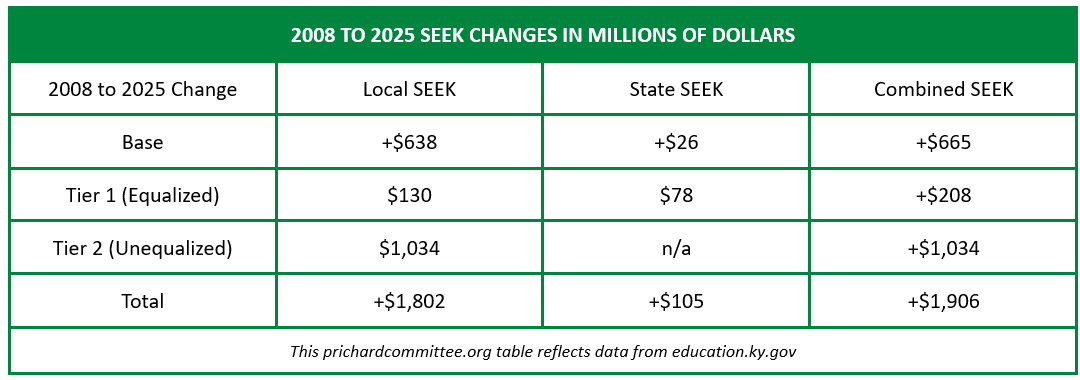Igniting a Literacy Renaissance in Kentucky with the Read to Succeed Act
Reading was always essential in my growing up. My dad read all the time and, as a very young child, I wanted to learn to read more than anything. Prestonsburg first grade was a great experience with Miss Elsie, but I was taught only to guess and memorize words. That did not give me the basis for higher reading levels, but I made it — even though I had to work harder than others at Randolph-Macon Women’s College to succeed!
As a young parent, I saw that my young first born was not learning to read, even though he was obviously very intelligent. It was imperative that our three sons be good readers, so I, along with other Knott County parents, founded the dyslexia program at the Hindman Settlement School forty years ago. We stumbled on the Orton-Gillingham instructional method and learned that reading can be taught systematically, using multisensory, explicit, structured techniques. In current terms, it is the Science of Reading.
For years, we struggled to find ways to inject the Orton-Gillingham approach into our public schools to help dyslexic students who were not learning to read. Now we are learning that Science of Reading helps not only dyslexic students, but many others who are not dyslexic.
Kentucky’s students deserve to be taught reading using Science of Reading, which incorporates methods that activate the auditory system in the brain. Current neuroscience validates using evidence-based programs to stimulate the brain’s reading pathways. In simple words, this involves teaching kids how to decode new words to access word recognition and comprehension.
Recently, our commitment to advancing literacy reached a new milestone here in Knott County with the initiation of the Honor Cadre’s Professional Development program, a collaboration between the Knott County Educational Endowment Trust Fund and Hindman Settlement School. This cadre, including administrators, teachers, and a special ed instructor are participating in the Language Essentials for Teachers of Reading and Spelling (LETRS) program to learn the Science of Reading, as many others across the state are doing so as well.
With the passing of the Read to Succeed Act (Senate Bill 9) in 2022, the Legislature equipped the Kentucky Department of Education with, among several policy shifts, tools to offer additional instruction for teachers and administrators via LETRS professional learning, which is offered at no cost, to ensure teachers have access to the current research of reading instruction.
Encouragingly, over 1,800 Kentucky educators across the commonwealth were registered for Kentucky Reading Academies in cohort 1 of the professional learning in 2022-23. Currently, over 2,600 educators have registered for cohort 2, beginning in October 2023.

The work began as soon as the bill passed. In the 2022-2023 school year, colleges and universities that offer teacher preparation programs for interdisciplinary early childhood education or elementary regular education, began including evidenced-based reading instructional programming. This includes the areas of phonemic awareness, phonics, fluency, vocabulary decoding and comprehension.
Senate Bill 9 also outlined the timeline for setting up universal reading screeners for K-3, which begins with this school year. The screener will be given in the first 45 days of the school year for all kindergarten students and in the first 30 days of the school year for grades 1-3. If the screener shows that a student may fall behind in reading, measures and supports to students will be provided.
Mississippi already embarked on this path, making big investments in Science of Reading instruction, and it’s paying off in steadily rising reading scores. For example, on the National Assessment of Education Progress (NAEP), Mississippi has created a 9-point improvement in percent proficient from 2011 to 2022. Over the same years, Kentucky saw a 4-point proficiency drop.
Kentucky doesn’t need to be last in reading. Our educational institutions can give teachers the tools to change, and our school districts can offer their students reading approaches that work. Kentucky kids shouldn’t have to work harder than their peers to succeed in life, like I once did. We now have the research and the policy to ensure every young learner can READ to SUCCEED, and be prepared for success in school and in life.
Lois Combs Weinberg, an Eastern Kentucky native, has a M.A. from Harvard University in Education and has worked teaching dyslexic students to read for forty years. Weinberg has served on the University of Kentucky Board of Trustees, the Kentucky Council on Postsecondary Education, and the Kentucky Prichard Committee for Academic Excellence.












